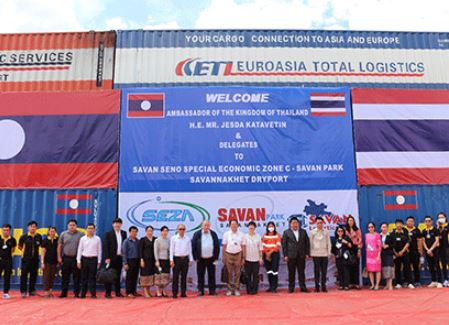The purpose of the site visit on Thursday was to learn about the development of Savan Park and Savannakhet Dry Port, which are ideally located in a strategic position close to Thailand and Vietnam, with a logistics system that is linked to the region and the rest of the world, bolstered by the newly-opened Laos-China Railway.
During the site visit by the Thai delegation, led by Ambassador Jesda Katavetin, the General Manager of Savan Park, Mr Tee Chee Seng, highlighted the overall development of Savan Park and the Savannakhet Dry Port.
He informed the guests that the Savan Seno Special Economic (Savan Park Zone C) is strategically located along the East West Economic Corridor (EWEC) and was developed on 234 hectares of wasteland into an industrial, commercial and logistics hub.
“Because of the strategic location setup of the EWEC by JICA, Savan Park SEZ realised the potential to develop this area into a free trade industrial zone,” he said.
Mr Tee also said that plenty of investors in the region were now looking to invest in Laos because of the incentives offered, the country’s political stability, the relative lack of natural disasters, low initial investment cost, and the low or zero import duty paid by importing countries on products that are “Made in Laos”.
“We welcome Thai investors to explore cross-border business opportunities and investment in this zone,” Mr Tee said.
With more than 6,000 students graduating in Savannakhet province each year, there are no problems with labour shortage, he added.
Mr Tee said Savannakhet province is training people in the skills needed for employment in the zone and the number of foreign employees was dwindling as more local people gained essential skills.
According to his report, some 65,000 Lao workers returned home from neighbouring countries during the Covid-19 pandemic, with many of them now willing to work in Laos instead of overseas.[read more...]
“We welcome Thai investors to explore cross-border business opportunities and investment in this zone,” Mr Tee said.
With more than 6,000 students graduating in Savannakhet province each year, there are no problems with labour shortage, he added.
Mr Tee said Savannakhet province is training people in the skills needed for employment in the zone and the number of foreign employees was dwindling as more local people gained essential skills.
According to his report, some 65,000 Lao workers returned home from neighbouring countries during the Covid-19 pandemic, with many of them now willing to work in Laos instead of overseas.[read more...]
Source: Vientiane Time
April 04, 2022













